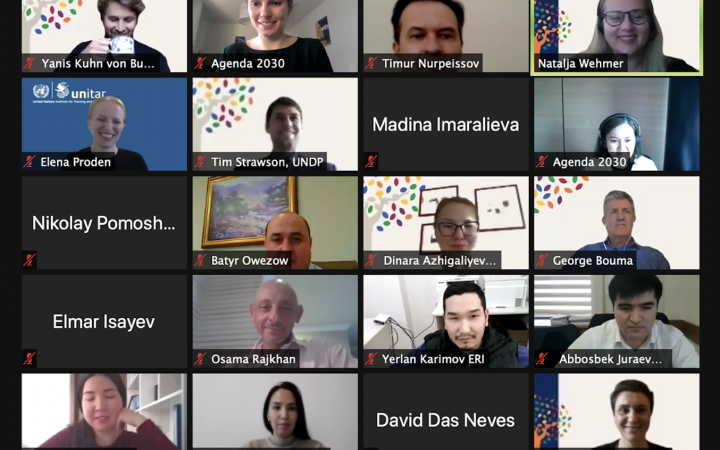27 January 2021, Geneva, Switzerland - Between 18-27 January 2021, UNITAR, UNESCAP, UNDP, and UNDESA jointly organized a Subregional Introductory Training for Countries of North and Central Asia on Integrated National Financing Frameworks (INFF) for Sustainable Recovery from the COVID-19 Crisis and for Achieving the 2030 Agenda for Sustainable Development.
With the beginning of the decade of delivery for the 2030 Agenda, mobilization of finance for the SDGs remains a challenge. The Covid-19 pandemic and the economic disruption it has caused has exacerbated this challenge and threatened the trajectories of countries’ long-term development plans. As the focus now begins to turn towards ensuring a sustainable recovery from the economic shock caused by the Covid-19 pandemic, the training aimed to share knowledge and build capacity within the INFF steering committees and core ministries of the nine North and Central Asian countries on how to design and implement a coordinated approach to financing the 2030 and Addis Ababa Action Agendas. Participants included members of ministries of finance, economy, labour, environment and health, as well as think tanks, NGOs, Parliament, UN organization, and academia.
The training comprised seven sessions, all in virtual modality, covering topics such as the four INFF building blocks, SDG costing, SDG-aligned budgeting and SDG-themed bonds. The sessions emphasized the exchange of experiences between countries and within governments, featuring case studies and expert speakers from central banks, think tanks, and governments, and break-out sessions to allow participants to apply what they had learnt to their country contexts.
A key focus of the training was providing several concrete approaches for the implementation of INFFs so that countries can bear these in mind as they explore how to launch a sustainable recovery from the Covid-19 health and economic crises. In the final session, country groups were asked to consider the first INFF steps they would take in their institution or workplace after the training. These actions including strengthening and enhancing INFF Oversight Committees, as well as some suggestions around specific topics covered in the training, such as agreeing on a methodology and pilot for SDG costing, or initiating SDG tagging in the budget by the Ministry of Finance. Another suggestion was to consolidate the efforts of line ministries to conduct a feasibility study on INFF, exemplifying the message of integration, coherence, and alignment that the training sought to deliver.
In the closing session, there was strong demand for continued engagement from the UN agencies on INFF, and feedback from participants echoed this, with calls for further in-depth training on specific topics, as well as strong demand for case studies and further opportunities for countries to learn from each other.
The pre-and after-session assessments showed on average a 13% increase in the participants’ knowledge and skills. Overall, 99% of the participants found the training useful and 94% would recommend the training to others. The things that participants found most useful were the bringing together of many countries and the opportunity to learn from others’ experiences, and the interactive discussions and group work. In the future, participants would like to see more deep-dive trainings on subjects such as financing strategies and SDG costing, as well as more case studies and country experiences, with a clear focus on know-how.
As a follow-up, UNITAR in conjunction with UNESCAP, UNDP, and UNDESA in collaboration with the country-led platform Asia-Pacific SDG Finance Facility (APFIN) organized a regional training for the Asia and the Pacific region entitled “Integrated National Financing Frameworks (INFFs) and Budgeting for the 2030 Agenda: Financing Sustainable and Inclusive Recovery”. The proposed training workshop was held on 29-31 March 2021 back-to-back to the 2021 Asia-Pacific Forum for Sustainable Development (APFSD) and will also provide space for connecting to recommendations from its Roundtables, and especially the Roundtable on SDG 17.


